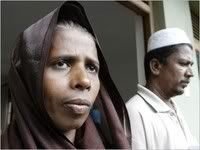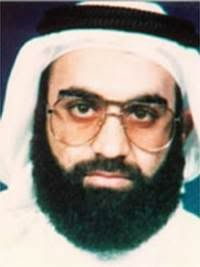skip to main |
skip to sidebar
Teenage Girl Faces Beheading in Saudi Arabia ABC News reports:
ABC News reports:The family of a 19-year-old Sri Lankan girl is pleading for her life after a Saudi Arabian court sentenced her to death by beheading.
The court found Rizana Nafeek, 19, guilty of murdering a child in her care while working in the country. Her family (parents pictured above) has appealed the sentence, and human rights groups are calling for the Saudi government to overturn it.
At 17, Rizana Nafeek was sent to Saudi Arabia after the tsunami to work as a maid and make money for her family in Sri Lanka. But after only a few weeks and no child care training, her employers put her in charge of their 4-month-old baby. The baby died, and Nafeek was charged with murder, tried without an attorney and sentenced to death.
"This case raises many troubling questions about the treatment of children and foreigners in Saudi Arabia's criminal justice system," says Varia. "Foreigners simply do not receive the same treatment in the Saudi justice system. This includes having translation during the interrogation and during court proceedings and having an attorney."
About 1.5 million Sri Lankans work abroad, according to the country's labor statistics. Eighty percent of the women working abroad are employed as unskilled domestic workers, primarily in Saudi Arabia.
Varia says domestic workers are vulnerable to mistreatment. When Human Rights Watch sent a team of investigators to Saudi Arabia last year, Varia says the group found egregious abuse.
"The most commonly reported abuse is unpaid wages," she says. "It's routine for employers to take the passports of workers, and in order for the worker to leave the country, they have to get their employer to sign an exit visa."
Under Saudi Arabian law, employers have a heavy hand in how justice is served. After being charged and interrogated, Nafeek signed a guilty confession. If her former employers formally forgive her, she will be released, but they have so far refused to do so.
Nafeek's parents told local media outlets that their daughter was not trained in child care and that the baby "choked on milk." Human Rights Watch is calling for a new investigation into the case.
Varia says that because domestic workers in Saudi Arabia are not protected by labor laws, they don't have access to training, paid leave, reasonable hours or even one day off.
"They're not seen as real human beings," she says.
"It is socially accepted to lock your domestic worker inside the house. There are employers who forbid their workers to make phone calls home or write letters or talk to neighbors," says Varia, who interviewed domestic workers' employers in Saudi Arabia. "The reason they give is that, 'We paid a lot of money for this worker, and if I leave the door unlocked, she'll run away.'"
The problem is so severe that the embassies of Sri Lanka, Indonesia and the Philippines in Saudi Arabia can have as many as 150 women staying in embassy shelters because of abuse suffered at the hand of their employer, says Varia
The Saudi Arabia Embassy in the U.S. has not responded to calls and e-mails from ABCNews.com for this story, but Nafeek's case and other recent cases have drawn attention to the issue in Saudi Arabia. The Saudi government has made public statements condemning abuse of domestic workers. There also have been discussions to place domestic workers under separate labor laws.
Varia says discussions and rhetoric are not enough; the laws must change.
"There needs to be much greater efforts to punish abusive employers and to protect workers," she says. "What will really matter is if domestic workers get the same rights as all other workers in Saudi Arabia."
 Khalid Sheikh Mohammed
Khalid Sheikh MohammedOlga Craig of
The Sunday Telegraph reports:
Two young sons of Khalid Sheikh Mohammed, the suspected mastermind of the September 11 attacks, are being used by the CIA to force their father to talk.
Yousef al-Khalid, 9, and his brother, Abed al-Khalid, 7, were taken into custody in Pakistan in September when intelligence officers raided a flat in Karachi where their father had been hiding.
Mohammed fled just hours before the raid but his sons and another senior al-Qaeda member were found cowering behind a wardrobe in the apartment. [Khalid Sheikh Mohammed was taken into custody in a joint Pakistani-CIA operation on March 1, 2003 near Islamabad.]
The boys have been held by the Pakistani authorities but this weekend they were flown to America where they will be questioned about their father.
CIA interrogators confirmed that the boys were staying at a secret address where they were being encouraged to talk about their father's activities. "We are handling them with kid gloves," said one official. "After all, they are only little children, but we need to know as much about their father's recent activities as possible. We have child psychologists on hand at all times and they are given the best of care."
Mohammed, 37, is being held in solitary confinement at the Bagram US military base in Afghanistan. He is being subjected to "stress and duress" interrogation techniques.
He has been told that his sons are being held and is being urged to divulge future attacks against the West and reveal the whereabouts of Osama bin Laden.
"He has said very little so far," a CIA official said on Saturday. "He sits in a trance-like state and recites verses from the Koran. But while he may claim to be a devout Muslim, we know he is fond of the Western-style fast life. His sons are important to him. The promise of their release and their return to Pakistan may be the psychological lever we need to break him."
The Kuwaiti-born Mohammed named his older son after Ramzi Yousef, his nephew, who was convicted of masterminding the 1993 attack on New York's World Trade Centre. After the attack, Yousef fled to the Philippines with his uncle.
When bomb-making chemicals set fire to their Manila apartment, Yousef fled to Pakistan, where he was captured in an Islamabad hotel room in 1995.
Mohammed was in the next room and, audaciously, gave an account of the arrest to a reporter. By the time Pakistani authorities found out his identity he had fled the country.
He was eventually arrested on March 1 in Rawalpindi, near the home of Pakistan's President Pervez Musharraf. Among the items found was a photograph of a smiling Mohammed with his arms around his two sons.
Known as "The Engineer", he is suspected of masterminding the Bali bombings and slashing the throat of American reporter Daniel Pearl in Pakistan in January last year.
Little is known of his sons' mother, who is thought to be Pakistani. "All we know is that she is the sister of an al-Qaeda member that Khalid Sheikh Mohammed met at a Pakistan college, the University of Dawa al Jihad, in the late 1980s," a source said.
Khalid Sheikh Mohammed has been indicted in America for plotting to blow up American commercial airliners in the Philippines in the mid-1990s, so once in the custody of a coalition partner, extradicting him to the U.S. to face trial and prison doesn't require putting the U.S. onto wartime footing.
But by what legal authority is the CIA kidnapping and interrogating children of suspected terrorists? Who is overseeing the care and rights of these children? What does the CIA plan to do with these children once they're done interrogating them?


